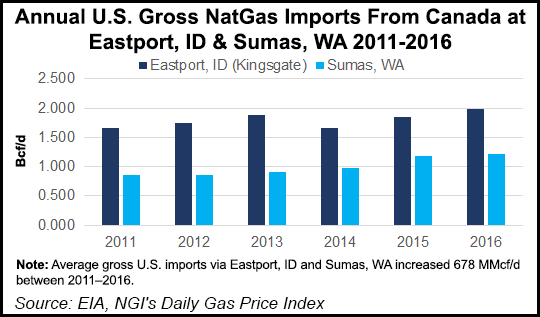Regulatory | LNG | NGI All News Access | NGI The Weekly Gas Market Report
Pacific NorthWest LNG Cancels Export Terminal Plans in British Columbia
Pacific NorthWest LNG canceled plans Tuesday to build a C$11.4 billion ($9 billion) liquefied natural gas (LNG) export terminal on the Pacific coast of British Columbia, citing unfavorable overseas market conditions.

The Asian-based sponsors, Malaysia’s state-owned Petronas, Japan Petroleum Export Corp., PetroleumBRUNEI, IndianOil Corp. and Sinopec-China Huadian, said they would instead develop their BC shale gas properties for North American sales.
Pacific NorthWest chairman Anuar Taib explained the disappointment in a brief statement. “The extremely challenging environment brought about by the prolonged depressed prices and shifts in the energy industry have led us to this decision.”
The consortium said the decision to drop the jumbo plan for 40 years of overseas tanker exports of 3.2 Bcf/d followed months of “careful and total review of the project amid changes in market conditions.”
As a drilling partnership titled the North Montney Joint Venture (JV), the Pacific NorthWest group continues to hold an 800,000-acre spread of supply development prospects in the richest, most accessible northern BC and Alberta shale gas formation.
TransCanada Corp. anticipated the LNG cancellation with a March pipeline application to the National Energy Board (NEB). Permission is sought to change the North Montney Mainline, originally approved as a supply conduit for the tanker terminal, into an addition of 1.5 Bcf/d to TransCanada’s Alberta and BC supply collection grid, Nova Gas Transmission Ltd. (NGTL).
The Canadian subsidiary of Petronas, Calgary-based Progress Energy, has signed up for 700 MMcf/d as operator of the North Montney JV. Another 785 MMcf/d of capacity has been sold to Calgary-based Kelt Exploration, Aitken Creek Gas, Painted Pony Petroleum Ltd., Arc Resources, Saguaro Resources, Black Swan Energy, Tourmaline Oil, Canbriam Energy and UGR Blair Creek.
The Asian consortium estimated its work to date on its Montney asset spread has identified 15,000 locations for horizontal drilling and hydraulic fracturing to tap 52 Tcf of economically viable gas reserves.
In response to the Petronas decision to pull the LNG project, TransCanada’s Karl Johannson, executive vice president of Canada and Mexico natural gas pipelines, said the Calgary-based operator was reviewing its options related to the proposed Prince Rupert Gas Transmission (PRGT) project “as we continue to focus on our significant investments in new and existing natural gas infrastructure to meet our customers’ needs.
“As part of our agreement with Petronas affiliate Progress Energy, following receipt of a termination notice, TransCanada would be reimbursed for the full costs and carrying charges incurred to advance the PRGT project. We expect to receive this payment later in 2017.”
Johannson said TransCanada was “proud of the work we have done along the PRGT route, which has allowed us to sign 14 project agreements with First Nations and secure the key regulatory approvals and permits. We have built strong new relationships, and we look forward to continuing our strong partnerships with First Nations and communities in BC as we develop other natural gas assets, including our North Montney Mainline project.”
The mainline project is “backed by independent 20-year commercial service agreements with 11 shippers (including Progress Energy), and pending regulatory approvals, we remain ready to move forward,” Johannson said.
“There is still a strong need for Canadian natural gas supplies to get to market, and the infrastructure we are building in Alberta and British Columbia — including recently announced multi-billion dollar investments in our NGTL system and North Montney Mainline — are designed to help move natural gas supplies to markets where they are needed.”
The overseas tanker terminal cancellation ends a five-year effort to launch LNG exports that included a special session of the BC legislature last year to approve favorable tax, royalty and other arrangements. Federal regulatory approvals were granted last fall.
But the NEB observed that market hurdles remained formidable, in a review released last week of Canadian prospects for breaking into the crowded global LNG scene. Lower-cost competition from the United States was rated as especially strong.
“Canadian LNG projects would generally be greenfield sites and incur higher costs than U.S. projects built on existing LNG import terminal sites,” said the NEB report.
“Most proposed Canadian LNG projects would rely on inland supply sources in northeast British Columbia and Alberta. This would require major new long haul pipelines or expansions of existing systems to transport natural gas to coastal liquefaction facilities — a major additional project expense that also requires regulatory approvals.”
The Pacific NorthWest cancellation leaves one proposal for a mega-scale BC tanker export terminal still standing: a 3.7 Bcf/d project proposed by the LNG Canada consortium of Shell Canada, Kogas, Petrochina and Mitsubishi Corp. Another 16 projects remain lined up on paper but reporting no progress.
LNG Canada, while continuing engineering and marketing work, foreshadowed delays with a recent application to the NEB. The group is asking for a five-year extension of its export license deadline for starting shipments, setting a new target date of 2027.
The request for more time echoes the NEB’s global development assessment. “The market for LNG has experienced significant changes,” said the Shell-led BC team.
“Global macro-economic factors have influenced a significant increase in natural gas production capacity that has outpaced demand growth in major and emerging LNG import markets. These factors have resulted in persistently low natural gas prices and increased competition among global LNG export projects.”
© 2024 Natural Gas Intelligence. All rights reserved.
ISSN © 1532-1231 | ISSN © 2577-9877 | ISSN © 1532-1266 |
